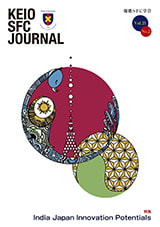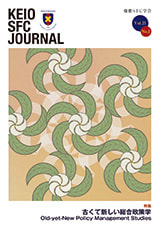- HOME
- KEIO SFC JOURNAL
- Vol.21 No.2

KEIO SFC JOURNAL Vol.21 No.2 India Japan Innovation Potentials
published on 2022.03
Old-yet-New Policy Management Studies
-
Foreword
Download this article (PDF): SFCJ21-2-01.pdfRajib Shaw (Professor, Graduate School of Media and Governance, Keio University / Director, India Japan Laboratory)
-
[India Japan Joint Webinar series]
Internet for Digital Transformation ―Possibility of India Japan Joint Collaboration
Jun Murai (Professor, Keio University) Possibilities for Co-innovation
Tsubasa Shiraishi (Vice Chairman, Rakuten India Pvt Ltd.) Japan and Yoga
Download this article (PDF): SFCJ21-2-002.pdfKazuaki Ohashi (Director, The Yoga Organization of Japan) Special Feature ArticlesInvited Papers-
[Research articles]
Indian Prime Minister Narendra Modiʼs Risk Management
Hiromi Hirose (Special Visiting Professor, Center for Study of South Asia at Gifu Womenʼs University / Former Bureau Chief of NHK New Delhi) The purpose of this paper is to clarify the risk management measures and results of Narendra Modi, the 18th Prime Minister of India. I analyzed various types of crises such as politics, economy, disasters, and infectious diseases that occurred during Modiʼs administration, and risk response measures. It can be pointed out that Modiʼs leadership has produced synergistic effects due to the rise in Hindu nationalism and his characteristics as a media politician. Although some limits were observed in risk response during the crisis of COVID-19 infection, administration approval rating was maintained at high level. It is possible that Modiʼs politics has overcome in some way the long-standing vulnerability of Indiaʼs democracy.
Download this article (PDF): SFCJ21-2-03.pdf -
[Review articles]
Indian IT Industry and Innovation
Yukio Takeyari (Senior Researcher, Keio Research Institute at SFC / Former Managing Director, Sony India Software Centre Pvt. Ltd.) The Indian IT industry is undergoing drastic changes. Major Indian IT service companies continue to grow into global giant companies. Multinational companies around the world have set up R&D centers in Bangalore and accelerate the development of new technologies. The number of start-up companies is increasing rapidly, and unicorn companies are being born one after another. As global IT technology innovation and business shift to emerging countries progress, US and European companies are actively strengthening cooperation with the Indian IT industry. On the other hand, the movement of Japanese companies is very limited. In this paper, I introduce the Indian IT industry, which continues to grow even in the corona pandemic and India, which is transforming into an innovation powerhouse with the acceleration of digitalization. And in the IoT era, I will consider Japan’s challenges and the possibility of Japan-India collaboration to solve them.
Download this article (PDF):SFCJ21-2-04.pdf -
[Review articles]
Exploring Hints of India Japan Technological Collaboration
Kotaro Kataoka (Associate Professor, Department of Computer Science and Engineering, Indian Institute of Technology Hyderabad) India has become an important partner to Japan in various levels and domains. Indian talents have also attracted attention given the increasing demand IT and DX human resource in Japan. However, both countries still need to develop mutual knowledge on Indian talents as well as Japanese industry and innovation ecosystem so that the bilateral collaborations will be more synergetic and innovative. This article explores hints of India Japan technological collaboration through reviewing the various attempts on Indo-Japan collaboration at Indian Institute of Technology Hyderabad (IITH) as well as sharing the real experience of serving as a JICA expert as well as a faculty member at IITH.
Download this article (PDF): SFCJ21-2-05.pdf -
[Research articles]
Urban Stress and Climate Change Issues ―Potential Role of Yoga
Akiko Kato (Part-time Lecturer, Faculty of environment and information studies, Keio University) Rajib Shaw (Professor, Graduate School of Media and Governance, Keio University) Human stress naturally depends on the environment. Changes in the environment in which people live in directly leads to changes in the causes of stress. Environmental changes such as urbanization also causes stress, but in this paper, the mental and physical stress caused by the new coronavirus infection (COVID-19), an unprecedented large-scale infectious disease disaster that has continued since last year, goes out. Considering how stress occurred under specific circumstances such as bans and self-restraint, yoga that is originated in India boosts human immunity (physical problems), complex urban lifestyles and urbanization, clarifying how effective it is to reduce mental stress in a special environment caused by a disaster. By taking a scientific approach it can be verified that Yoga has great significance in our new normal. In the research, data will be collected on the effects of yoga on the mind and body in Japan. In particular, 1) a survey to Japanese university students who have experience in using yoga as a countermeasure to stress and the cause of it 2) a research on how Yoga was used by those experienced for stress management during the COVID-19 pandemic were conducted. By doing so, the cause and coping methods of stress circumstances under special situations such as urbanization and disasters can be visualized.
Download this article (PDF):SFCJ21-2-06.pdf -
[Practical reports]
India-Japan Collaboration in Music & All It Touches When a Sound is Worth a Thousand Pictures
T. M. Hoffman (Performing artist / scholar / activist Director, Indo-Japanese Music Exchange Association) Successful innovation requires compatibility between components and processes involved. In aural characteristics of language and music, Japan resembles India more than either China or the West. Although orthography in language and instruments in music may to the eye suggest otherwise, in-depth analysis and cooperative development in Japanese music and language arts are supported through theory and practical training systems developed in India. Japanese instruments shakuhachi (1992~) and koto (2006~), and Japanese poetry including tanka and haiku (2003~), have been authenticated for Indian classical music by Bhatkhande Music College, Sangeet Natak Akademi, and American Institute of Indian Studies, and performed throughout India, Japan and beyond.
Download this article (PDF): SFCJ21-2-007.pdf -
[Research articles]
Stakeholder Perception of Addressing Water Stress in Nagpur, India ―Lessons for Enabling Participatory Governance
Vibhas Sukhwani (Doctoral Program, Graduate School of Media and Governance, Keio University) Rajib Shaw (Professor, Graduate School of Media and Governance, Keio University) While the situations of ‘water stress’ are progressively on the rise, the rapid urbanization trends are also leading to urban-rural water conflicts, evident from the case of Nagpur, India. Due to the varied stakeholder groups at multiple levels, it has therefore been realized that the consideration of diverse stakeholder interests and values is essential for effective water resource management (like in Japan). In light of that, this research adopts a qualitative approach (key informant interviews) to establish a comprehensive account of stakeholder perception in Nagpur for enabling a participatory governance approach.
Download this article (PDF): SFCJ21-2-08.pdf
Free Subject ArticlesSubmitted Papers-
[Research articles]
At the Intersection of Multicultural Policy Environment of Latin America and Japanese Experience of Disaster Prevention Workshops ―Narrative Approach to People’s Understandings of Disasters, Role of Communicators, and Interaction between Indigenous Knowledge and Modern Science in Mexico and Peru
Takuya Iwahori (Visiting Research Fellow, Faculty of Environment and Information Studies, Keio University) Ami Pareek (Master's Program, Graduate School of Media and Governance, Keio University) Mamoru Fujita (Assistant Professor, Faculty of Environment and Information Studies, Keio University) Satoko Oki (Associate Professor, Faculty of Environment and Information Studies, Keio University) This research shows how disaster science communication coupled with the emerging tendencies in Latin American multiculturalism opens up new perspectives on narratives and the role of communicators, which constitutes a cutting-edge public policy arena of “interculturality” and “plurality of knowledges.” Fieldwork was carried out visiting and experimenting disaster education initiatives and workshops in Zihuatanejo, Mexico and Cusco, Peru. Narrative approach reveals the way local people construct their own realities of natural disaster phenomena based on indigenous knowledge, as well as on modern scientific knowledge.
Download this article (PDF): SFCJ21-2-09.pdf -
[Research articles]
Narrative as Mimesis in Aynu Oral Tradition ―The Role of Evil Gods and Japanese in Chants of Gods and Prosaic Tales
Masaki Ishii (Master's Course in Cultural Anthropology, Department of Interdisciplinary Cultural Studies, Graduate School of Arts and Sciences, The University of Tokyo) This paper examines the Aynu oral tradition narratives from the perspective of Michael Taussigʼs theory of mimesis, and describes how narrative as mimesis works to situate evil gods and Japanese in the Aynu society. We analyze 45 chants of gods and prosaic tales to draw out different perspectives and typologies through which the Aynu society conceptualizes the
Download this article (PDF): SFCJ21-2-10.pdfbilateral relationship, arguing that this serves to incorporate and situate foreign gods and Japanese into Aynu society by narrating them not only as a threat, but also as a being from whom the Aynu can draw out their powers to their benefit.
©2020 Keio SFC Academic Society All rights reserved. -

